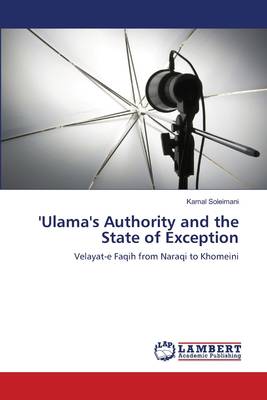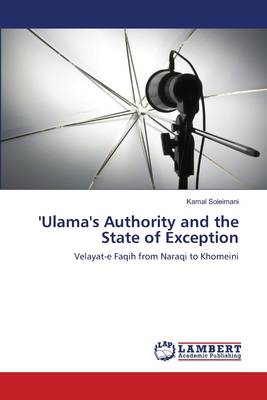
- Afhalen na 1 uur in een winkel met voorraad
- Gratis thuislevering in België vanaf € 30
- Ruim aanbod met 7 miljoen producten
- Afhalen na 1 uur in een winkel met voorraad
- Gratis thuislevering in België vanaf € 30
- Ruim aanbod met 7 miljoen producten
Zoeken
'Ulama's Authority and the State of Exception
Velayat-e Faqih from Naraqi to Khomeini
Kamal Soleimani
Paperback | Engels
€ 58,95
+ 117 punten
Omschrijving
The 1979 Iranian Revolution and the subsequent formation of the new state brought both Ayatollah Khomeini and the concept of Velayat-e Faqih (the authority of the jurist) to a worldwide audience. However, the concept itself has a relatively long history in Shi'i juridical endeavors. From its inception, the Twelver Shi'i religion justified its opposition to the dominant Sunni majority and tied its raison d'être to the claim of having access to 'infallible guidance and leadership. This exclusive spiritual and political leadership became available to Shi'ism through its belief in the divine leadership of twelve religious figures who were all descendents of Muhammad, the Prophet of Islam. This theo-political approach to the issue of political authority renders the concept of Velayat-e Faqih (authority of the jurist), as advocated later by the likes of Khomeini, both paradoxical and possible.
Specificaties
Betrokkenen
- Auteur(s):
- Uitgeverij:
Inhoud
- Aantal bladzijden:
- 80
- Taal:
- Engels
Eigenschappen
- Productcode (EAN):
- 9783659146954
- Verschijningsdatum:
- 13/06/2012
- Uitvoering:
- Paperback
- Afmetingen:
- 150 mm x 220 mm
- Gewicht:
- 127 g

Alleen bij Standaard Boekhandel
+ 117 punten op je klantenkaart van Standaard Boekhandel
Beoordelingen
We publiceren alleen reviews die voldoen aan de voorwaarden voor reviews. Bekijk onze voorwaarden voor reviews.







